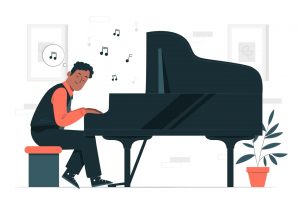
Most of us parents are the same when it comes to the piano.
You want your child to learn it so you can brag about it
But of course, not everyone thinks like that. And even then, it comes down to our sincere wish that our child can be multifaceted in life.
As they say, all work and no play makes Jack a dull boy. Piano can be seen to be a classy pastime that’s much better than sinking time playing video games.
But will Jack really think learning the piano is “playing”? For many, picking up piano requires so much practice that it dulls the initial joy of playing it. Today, there are so many other hobbies catered to the consumer culture in Singapore, that it’s hard to say picking up the piano is “fun” anymore.
Not to mention the development of Artificial Intelligence (AI) is now leading to music that can be created in seconds! Will the implication of AI being “better than us as musicians” dry up our kids’ motivation to learn piano?
All of these questions and more, answered today!
The Changing Times: AI and Music

Let’s first address the elephant in the room— AI.
Ah, the dreaded word that brings change, for better or worse. When it comes to music and the arts, however, AI treads a fine line of controversy.
“AI will doom the creation of human art.” I heard someone say that once.
Perhaps they’re right in some ways. AI music generators like Soundraw, Amper Music and more can “learn” from large samples of music and generate music with similar patterns, styles and structures. It’s definitely beneficial as it speeds up the music-making process drastically. On the flip side however, is music without the need of a human’s creative direction, really “music”?
In other news, AI has also become so attuned to the unique characteristics of voices and pitch that AI-generated covers of songs have already become ‘commonplace’. Check out this cover of Bohemian Rhapsody sung by the AI mimicking Frank Sinatra’s voice!
While AI mimicking voices to sing silly songs is amusing, it’s easily just as exploitable for bad. Phishing scams, or online impersonators spreading false news… need us say more?
Well, we’re straying a little off topic here, but the point is that AI has made music much easier to learn, make, produce and replicate. But when it comes to PLAYING the piano, here’s the good news!
Playing the Piano is an Irreplaceable Skill

[Freepik]
Pattern recognition, motor skills, creativity and most of all, emotional expression.
Good piano playing combines all of these and transforms it into a performance that one won’t simply think of as something played by an AI.
You see, humans still treasure and see value in musical expression. This is why people will still attend live concerts of singers to feel and hear those unfiltered voices up close. Music that is performed from the soul is ‘imperfect’, and those imperfections are what makes us enjoy music as a form of art.
AI has undoubtedly made progress with ‘organic’ piano playing, and can even reproduce complex musical pieces in certain cases. But human musicians compete and excel in areas beyond technicality. This is why pianists will remain a uniquely irreplaceable profession or role for the foreseeable future.
Why Learning the Piano is Still Good for Your Child
So we’ve established that learning and playing the piano is still a valuable skill to have. But outside of those who’ve set a clear path towards a musical profession, should you really let your child learn the piano if it’s not going to be career-defining?
The answer is still yes! You see, learning how to play the piano actually raises the overall latent potential in your child at an early age!
Piano Skills Brings Confidence

[Freepik]
Confidence? Well yeah! Your child is head above shoulders when compared to peers who don’t have a musical background. It can definitely raise their self-esteem. A confident individual will exude charisma that attracts people to them, and will in turn give them a big boost in their social life!
No one hates a guy who knows how to play piano!
Process of Repetition Builds Discipline
Discipline. Piano lessons often consist of repetition and practice. As a child, sitting in the same place and playing the same notes over and over again can feel boring and meaningless. But as they sit through lesson after lesson, a valuable trait of patience is cultivated.
Playing Piano Relieves Stress

When your child’s piano skills are fully honed, playing the piano will become a calming and therapeutic experience! But before that, your child needs to undergo equal amounts of sweat and effort in order to reach that level!
Learning Process Improves the Senses
As your child slowly learns and graduates ranks from a beginner to an expert, they become more exposed to challenges that require strong hand-eye coordination, comprehension and split concentration. Keeping the mind engaged and active like that can lead to positive brain development.
As they adapt and build upon those skills, your child will definitely see a big boost in their cognitive function! Memory, learning and listening skills, as well as an ability to multitask are ALL immediately applicable to your child’s studies as well!
Appreciating Art and Music

[Freepik]
Last but not least, playing the piano for a long enough time can unlock the creative part of the brain! It elevates your child to someone who can appreciate and understand the arts and music.
This facet of learning the piano is often overlooked, but your child will definitely appreciate a much more beautiful way to look at the world today!
Factors to Consider Before Starting
Let’s go right into what you should look out for when starting out! Your child, and most likely the household will be affected by this decision! If you don’t wanna be caught off guard by any of them, take a note of them!
The Cost of a Piano

[Freepik]
It’s obvious right? But despite so, this initial cost is often overlooked and has become one of the biggest hurdles for parents deciding against learning the piano. From a digital piano, to stage, hybrid, upright, and grand piano, prices vary from $300 to upwards of six digit sums! Decide what is best for your child at any given time, and make an appropriate purchase that you can be satisfied with.
What about second-hand pianos? If you want to get a second-hand piano to cut some costs, be sure to check for their market price, duration of use, sound quality and existing warranty!
The Space Required to Keep a Piano

[Freepik]
And then, we have to consider the space you’ll need to keep the piano around. In the living room? Their bedroom? Pianos vary in sizes, but you generally won’t have an issue with digital ones as they usually come in the form of a keyboard. But for the bigger ones, make sure you do your measurements before bringing it over!
The Cost of Piano Lessons

[Freepik]
Piano lessons aren’t free, or cheap! You also need to be financially stable enough to handle your child’s interest as they continue their musical journey!
Lessons can cost anywhere from $40 to upwards of $90 per hour here in Singapore. The range varies depending on the teacher’s education, performing level, location, lesson length, and whether it’s an in-person lesson or not (yes, many piano teachers now teach online!)
But in short, you can average lessons to be $80 each time.
The “Noise” When Practising Piano

[Freepik]
Next, you’ll want to assess if the household environment is comfortable enough to accept the noise of playing ‘bad piano’ at the beginning, or vice versa! Your child also needs a quiet environment to hear the notes accurately. They need to be rid of distractions so that they can learn the piano properly.
ALSO, be mindful of making too much noise in your neighbourhood! Be sure not to play too early in the day or too late at night!
Understanding Priorities

[Freepik]
Finally, your child must understand their priorities as a STUDENT. Never have the piano affect or influence your child’s grades in any way! Their studies will only progressively get harder, so if your child cannot assess themselves objectively, you must be the one to judge when to stop accordingly!
Why Stop at the Piano?

[Freepik]
As your child progresses through their musical journey, they may discover new parts of themselves that they never did. A latent latent in the arts, or simple but lifelong interest in music. Whatever it is, piano playing is merely part of the bigger whole of understanding music.
So… why not stop there? A guitar? The drums? Or the violin? No matter what you choose, know that learning how to play music is a valuable skill in today’s digitised world.
To stand apart from the crowd of peers who live their lives never tapping into their hidden talents, we believe that learning how to play and appreciate music needs to start young!
